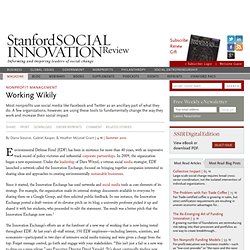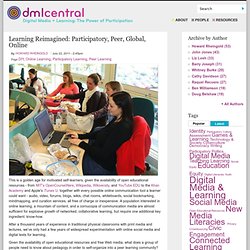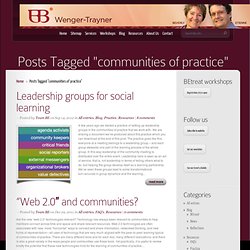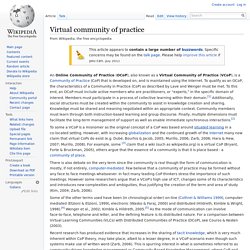

Working Wikily. Most nonprofits use social media like Facebook and Twitter as an ancillary part of what they do.

A few organizations, however, are using these tools to fundamentally change the way they work and increase their social impact Environmental Defense Fund (EDF) has been in existence for more than 40 years, with an impressive track record of policy victories and influential corporatepartnerships. In 2009, the organization began a new experiment. Under the leadership of Dave Witzel, a veteran social media strategist, EDF launched a network called the Innovation Exchange, focused on bringing together companies interested in sharing ideas and approaches to creating environmentally sustainable businesses.
Since it started, the Innovation Exchange has used networks and social media tools as core elements of its strategy. The Innovation Exchange’s efforts are at the forefront of a new way of working that is now being tested throughout EDF. Www.thersa.org/__data/assets/pdf_file/0006/333483/ConnectedCommunities_report_150910.pdf. Virtual Team Animation. Wikiversity offers a course on online educational resources. Learning Reimagined: Participatory, Peer, Global, Online.
This is a golden age for motivated self-learners, given the availability of open educational resources - from MIT's OpenCourseWare, Wikipedia, Wikiversity, and YouTube EDU to the Khan Academy and Apple's iTunes U, together with every possible online communication tool a learner could want - audio, video, forums, blogs, wikis, chat rooms, whiteboards, social bookmarking, mindmapping, and curation services, all free of charge or inexpensive.

A population interested in online learning, a mountain of content, and a cornucopia of communication media are almost sufficient for explosive growth of networked, collaborative learning, but require one additional key ingredient: know-how. After a thousand years of experience in traditional physical classrooms with print media and lectures, we've only had a few years of widespread experimentation with online social media and digital texts for learning.
Tools are only the beginning. Attitudes and methods are essential, too. Big Lessons Learned. Communities of practice. Leadership groups for social learning A few years ago we started a practice of setting up leadership groups in the communities of practice that we work with.

We are sharing a document we’ve produced about this practice which you can download at the end of this post. The practice goes like this: everyone at a meeting belongs to a leadership group – and each group stewards one part of the learning process of the whole group. In this way leadership of the community meeting is distributed over the entire event. Leadership here is seen as an act of service, that is, not leadership in terms of telling others what to do, but helping the group develop itself as a learning partnership. Read more “Web 2.0″ and communities? Online community of practice. An Online Community of Practice (OCoP), also known as a Virtual Community of Practice (VCoP), is a Community of Practice (CoP) that is developed on, and is maintained using the Internet.

To qualify as an OCoP, the characteristics of a Community in Practice (CoP) as described by Lave and Wenger must be met. To this end, an OCoP must include active members who are practitioners, or “experts,” in the specific domain of interest. Members must participate in a process of collective learning within their domain.[1] Additionally, social structures must be created within the community to assist in knowledge creation and sharing. Knowledge must be shared and meaning negotiated within an appropriate context. Community members must learn through both instruction-based learning and group discourse. To some a VCoP is a misnomer as the original concept of a CoP was based around situated learning in a co-located setting. On-Line Communities of Practice[edit] Current Research[edit] Advantages[edit] CEFRIO_Book_Chapter_v_5.2.pdf. Ro.uow.edu.au/cgi/viewcontent.cgi?article=1148&context=commpapers.
Papers/Hoadley-Kilner-SIGGROUP05.pdf. Net.educause.edu/ir/library/pdf/nli0531.pdf. Wp-content/uploads/2011/03/0143_Platforms-and-Tools-march-2011.pdf.